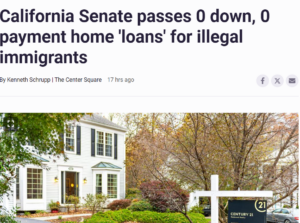At Extreme Investor Network, we provide unique insights and analysis on economic trends and policies that impact the financial landscape. Our goal is to help investors make informed decisions in an ever-changing market. Today, we want to discuss a controversial topic that has been making headlines recently – the issue of migrants receiving free housing in California.
The US government’s approach to migrants versus citizens has sparked a heated debate. California’s Senate recently passed a bill that allows illegal migrants to access housing loans at 0% interest with no down payment required. Additionally, grants of up to $150,000 are being offered to help these individuals purchase a home. This move has left many California citizens questioning the Democrats’ justification for such a blatant scheme.
One key aspect that is often overlooked is the economic implications of this program. While some may view it as a compassionate solution to the migrant crisis, there are concerns about the long-term sustainability of providing free housing to individuals with no proven work history or potential for future earnings. US citizens, on the other hand, face stringent requirements from banks when seeking housing loans, including solid employment history, good credit, and a low debt-to-income ratio.
The disparity between how migrants and citizens are treated in terms of housing assistance raises questions about fairness and fiscal responsibility. With California already facing a significant deficit and a high homeless population, the added strain of providing free housing to migrants raises legitimate concerns about the state’s financial health.
State-sponsored programs like Oregon’s Camino a Casa initiative, which offers $30,000 in housing assistance exclusively to illegal migrants, further exacerbate the divide between migrants and citizens when it comes to accessing housing support. This unequal treatment has prompted criticism from California Senate Minority Leader Brian Jones, who questions whether taxpayer funds should be prioritized for illegal immigrants over legal residents in need.
As investors, it is crucial to consider the broader implications of such policies on the housing market and the overall economy. The impact of providing free housing to migrants on property taxes, insurance premiums, and local infrastructure must be carefully evaluated to understand the long-term consequences of these initiatives.
At Extreme Investor Network, we strive to provide our readers with in-depth analysis and unique perspectives on economic issues like the migrant housing crisis in California. Stay tuned for more insights and updates on key developments in the financial world.

